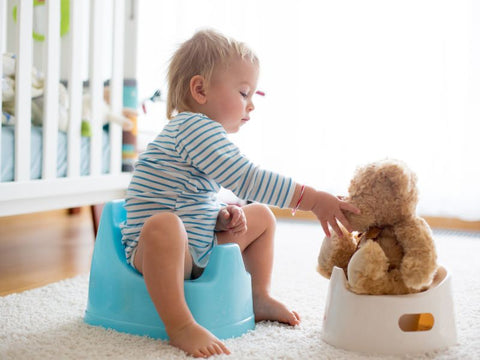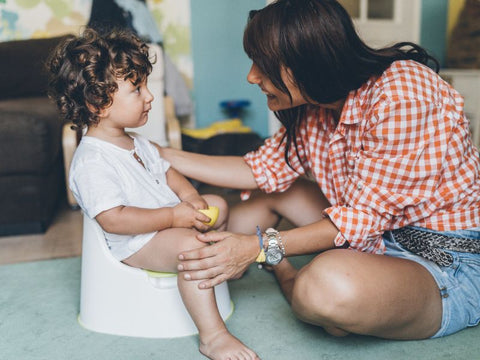Potty Training 101: A Guide to Toilet Training Your Toddler
Potty training is a significant milestone in your toddler's journey towards independence. While it can be a challenging and sometimes messy process, with patience and a positive approach, you can successfully potty train your little one. In this guide, we'll walk you through the steps and tips for a successful potty training experience.
Timing Is Key
Potty training readiness varies from child to child. Most toddlers show signs of readiness between 18 and 24 months, but it can happen earlier or later. Look for signs like showing interest in the potty, staying dry for longer periods, and communicating when they need to go.
Create a Potty-Friendly Environment
Designate a child-friendly bathroom space with a potty chair or a child-sized seat reducer for the regular toilet. Make it inviting with colorful decorations or books to keep your toddler engaged.

Demonstrate and Explain
Show your toddler how to use the potty. Explain the process in simple terms and encourage them to watch you or older siblings use the toilet. Use words your child can understand.
Choose the Right Equipment
Invest in a comfortable and age-appropriate potty chair or a step stool for the regular toilet. Let your toddler pick out fun underwear with their favorite characters to make the process exciting.
Consistent Routine
Establish a consistent schedule for potty breaks, such as after meals and before bedtime. Encourage your toddler to sit on the potty at these times, even if they don't feel the urge.
Celebrate Small Wins
Praise and celebrate every successful potty trip, no matter how small. Positive reinforcement goes a long way in motivating your toddler.
Stay Patient and Calm
Accidents will happen, and it's essential to remain patient and calm. Avoid scolding or punishment for accidents, as it can create anxiety around potty training.

Use a Reward System
Consider implementing a reward system, like stickers or a small treat, for each successful trip to the potty. This can provide motivation for your toddler.
Dress for Success
Dress your toddler in easy-to-remove clothing. This allows them to get to the potty quickly when the urge strikes.
Encourage Independence
Let your toddler flush the toilet, wash their hands, and pull up their pants independently. Encouraging self-help skills fosters a sense of accomplishment.
Nighttime Potty Training
Nighttime dryness may take longer to achieve. Use pull-up diapers or training pants designed for nighttime until your child consistently wakes up dry.
Be Prepared for Setbacks
Regression is common during potty training. If your toddler starts having accidents after initial success, it's okay. It's often a phase, and they will get back on track.
Consistency Is Key
Stick to the routine and remain consistent. Encourage caregivers and family members to follow the same approach.
Keep It Positive
Maintain a positive and encouraging attitude throughout the process. Your enthusiasm will motivate your toddler.
Know When to Pause
If potty training becomes too stressful for your child or you face resistance, it's okay to take a break and try again later.
Every child is unique, and potty training may take weeks or even months. Stay patient, celebrate each milestone, and, most importantly, provide plenty of love and support. With time and persistence, your toddler will successfully transition from diapers to using the potty with confidence.
Potty training is a significant achievement for your child, and it's a proud moment for parents too. Embrace the journey, and before you know it, you'll have a potty-trained toddler ready to take on new adventures.










